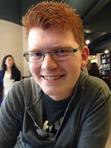Tommy Collison's Blog
June 5, 2014
6/5/14
Just in the door from an SF speakeasy organized by the Electronic Frontier Foundation (EFF), the digital rights non-profit who helped the Students Against Surveillance campaign this semester. Props to Yan and Parker in particular, who spoke eloquently and compellingly on the encryption staff panel. It was also gratifying for me to see April's amazing work recognized -- she was my contact at the EFF, and her work with college activists is particularly praise-worthy.
Speaking of the SAS campaign, given that Reset the Net's day of action is winding down here in PST, the letter campaign (which garnered over 15 university-specific letters and 450+ signatures) may go quiet for the rest of the summer. Maybe, maybe not. I'm new to politicking and trying to bring about change on college campuses, but it's my instinct that letters themselves don't bring about change -- they bring about a conversation which has the potential to be a catalyst for change, which is, I think, their inherent usefulness. I'll continue to update the HTML as more signatures come in, but I'd say we'll start back in earnest in September. For now, we think about what IT policies we want the NYU administration to implement, and start planning a crypto-party. (Or several.) I'm thinking of trying to set up NYU Students for Digital Rights or something on campus next semester, if only for the ability to book rooms.
I'm turning 20 this month, and I totally expected to be more introspective. Maybe it's because 21 is the important age in the US, but I haven't found myself reflecting too much on my teenage years. The world only spins forward, I guess.

Dolores Park, SF.
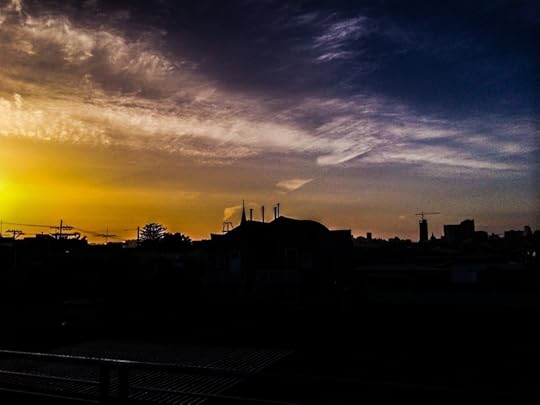
SF skyline
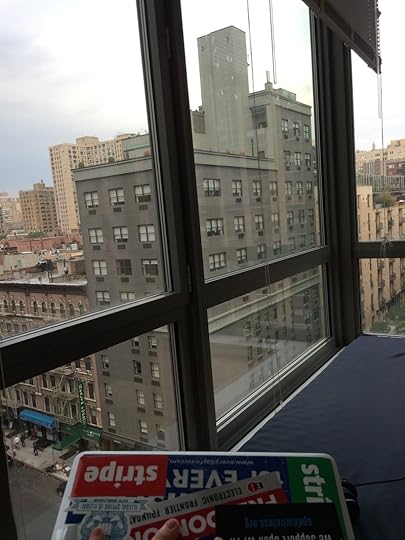
I spent a few days in NYC after the semester ended, catching up on projects and generally enjoying the city without having classes. I'd like to say that this involved more than sitting cross-legged on the floor on my laptop, but I'd be lying.
May 30, 2014
Work
I sat down with Kashmir Hill today -- Forbes's senior online editor who writes about those areas "where technology & privacy collide". As I walked back to the BART, I thought of the phrase "If you get paid to do what you love, you'll never have to work a day in your life." Given that phrase and my current interests, I'm glad that there are journalists out there who specialize in digital security.
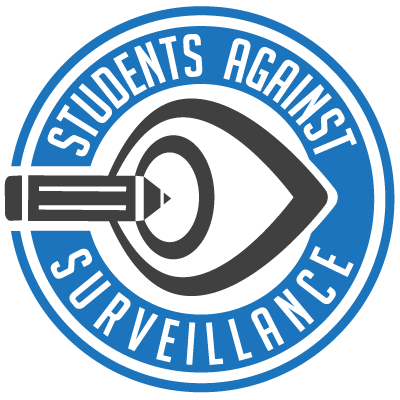
Students Against Surveillance now has a logo and seven university-specific letters. We're planning one or two projects for the fall, which I'll talk about here when they're more concrete.
May 26, 2014
A Medium Response
I want to take two minutes to respond to a Medium post Brian Murray wrote last week in response to two tweets I posted about a culture of negativity I saw in the Irish tech scene.
I started blogging in April 2007, and was involved in the Irish tech scene from then up until I moved to the US in August 2013. I got to know a lot of bloggers, coders, and designers during that time, through events like the Irish Blog Awards and assorted meet-ups. My experience of the scene was that it was a relatively small pond with a handful of relative heavyweights. Tweets like this one felt like the norm, and the attitude behind it didn't feel like a 'minor transgression' or an isolated incident.
As soon as I read [two of Tommy's tweets] I felt hurt, on many counts.
First off, I am Irish. Secondly, I am involved, if only on the fringes, in the tech community in Ireland. Lastly, there’s nothing that boils my blood more than watching somebody translate a minor number of transgressions into a brush with which to tar an entire community.
Everyone's experience of Ireland and its tech scene is different. A handful of people have e-mailed me saying that their experience with the tech scene was nothing but positive, and that's great. But that wasn't my experience.
May 25, 2014
Thoughts on Finishing Semester #2
I think the biggest takeaway from this year has been that it's okay not to know what you want to do. Anecdotally, I encountered far fewer people freakily set on a chosen in freshman year of college than I did in high school -- abjuring old major beliefs might as well have been an orientation event.
I arrived in Washington Square in August self-identifying as a prospective journalism and economics major. Two semesters later, I'm much less sure. I realized that economics doesn't interest me as much as I first thought, and I'm only interested in very specific subsections of journalism: media criticism, or how current technologies fit with civil liberties and the law, rather than straightforward reportage.
But that seems to have been the point of freshman year. I fulfilled a ton of requirements. My favorite classes were probably from the fall -- an introduction to Chinese history (1830-1949) and a New York literature seminar that was less of a structured class and more a group of students meeting with an adjunct professor in Silver 507 every Thursday afternoon. He was good-natured but firm in his advice that majoring in journalism at an undergraduate level was a silly idea, and I think I came round to his advice. Right now, I'm trying to change schools at NYU to major in media, cultures, and communications (MCC). I'm still trying to distill that to digital media with a side of technology-interacting-with-the-law, but it's a work in progress. If I follow this track, I'll also have room for three electives, slots where I can take almost any class. They'll be my law classes, or something random like art history.
One thing I realized this year is that nobody tells you just how much your college career is filled with uncertainty. Seriously -- if I was to give one piece of advice to incoming freshmen, I'd tell them that not knowing is okay. If someone had told me that, I'd have been much less stressed. One of my coping mechanisms became looking at people I admired and looking at the track they took. Alec, one of the guys I'm working with at the Student Net Alliance, majored in MCC, and that's how I learned about the program. (Side note -- congrats on graduating, Alec!) Glenn Greenwald started out as a litigator, and he's talked about how that experience was useful to him in the early days of the Snowden story. I'm not saying that Greenwald's perfect, or going from lawyer to columnist is the best -or only- path in life, even if it's where I think my interests lie. Still, I think it's worth looking at people in the sphere you're interested in and seeing how they got there. NYU doesn't have a pre-law track and going to graduate school seems diametrically opposed to all the dropping-out-of-college jokes I make, but that's not to say that I can't take electives in the area if it continues to hold my interests.
I found myself getting much more involved in campus activities this semester, as I found my feet in New York and shifted my focus away from academics full time. I got involved with Tech@NYU and the Student Net Alliance. Being more comfortable in New York City definitely helped, and I had great friends outside NYU who got me out of the Village now and then. I also volunteered with NYU's LGBTQ center, and next semester I'll be working on their project to educate the campus population on issues facing queer individuals.
I said at the beginning of the semester that I was looking forward to trying a politics class because it didn't represent that big a time commitment -- if I ended up not liking international politics, a quarter of a semester isn't much time "wasted". As it turned out, I found that studying I.P. was fascinating, but I don't think I want to spend more time studying it. I loved the readings and the fact that everything followed common sense (it stood to reason that a second-strike nuclear defense system can only be effective if it's not secret, for example), but I didn't find it particularly compelling as a subject. Whether that's true of all politics classes or just the branch of game-theoretical international politics I took this semester remains to be seen.
As I write this, I'm in San Francisco, where my brothers live. I'll be based here for the next two months tinkering on projects and generally enjoying a change in scene. I fell hopelessly in love with New York City this year, but I don't agree with those classmates who can't see themselves living anywhere else ever again. It's a great city with a ton of great opportunities, but other places, both in the US and abroad, have a lot going for them too. In January, I started work on another piece of extended fiction that's currently parked on my hard-drive. At the moment, I don't have plans to return to it right now. 99% of my writing right now is copy for various activism causes, and it's hard for me to disconnect from that and go back to fiction (especially when the genre is also cyber-security).
As always, I'll share big news here.
May 23, 2014
Nieman Reports | Revealing a Reporter’s Relationship With Secrecy and Sources
These excerpts from lectures by Barton Gellman, a Pulitzer Prize-winning Washington Post journalist, are well worth a read. He discusses the relationship between national security and a journalists' adversarial role, as well as how he goes about writing a story on classified information.
Gems:
There is nothing anomalous here. I’m a projects reporter, and now my project is the weapons hunt. Nearly everything I want to know, and much of what I write, is classified. One day my adopted survey team seized a suspicious document, handwritten in Arabic and illustrated with sketches of laboratory glass. The document turned out to be a high school science exercise. The survey team’s report was classified. The school-book exercise was appended to that report—which means that some Iraqi teenager’s description of Boyle’s Law is a classified U.S. government secret. A qualified authority made a binding judgment that disclosure of this text would do “serious damage to national security.” So don’t ask me about the relationship between the pressure and volume of a gas held at constant temperature. I’d tell you, but I’d have to kill you.
[...]
What happens when government conceals from us its deeds on behalf of our defense? With stakes of life and death, it is easy to see the vital need to deny advantage to an enemy. But life-and-death stakes give equal urgency to the project of holding our leaders accountable for their use of power. If we are sovereign, we rule those who rule us. Secrecy corrodes self-government, just as it strengthens self-defense. Both interests reach peak importance in time of war.
May 19, 2014
Moore's Law Applies to Surveillance, Not Just Chips
The argument has always been whether technology will be a liberating force or just another tool in the arsenal of the surveillance state. Improving technologies were always going to play a part in fighting and furthering surveillance -- it allows activists to send encrypted e-mails at the same time as it allows governments to collect the telephone records of tens of millions of Americans.
It's for this reason that I believe mass collection of data was at least somewhat of an inevitability. Technology empowers governments and so there's a big temptation to overreach. Think how much harder the Stasi had to work -- they had to steam envelopes open, maintain paper records, and manually listen to telephone conversations. Technology makes it so much easier to overreach, and so in terms of fighting against this sort of intrusive surveillance, the focus has to be on restraint and on responsible use of technology. The genie's out of the bottle -- nobody's going to uninvent the Internet.
Moore's Law refers to an observation made by Gordon Moore, co-founder of Intel Corporation, who noted that the number of transistors on a chip doubles roughly every two years. This basically means that computers get better and consumers get more power/capability for less. A 60 GB Western Digital hard drive cost $139.99 in September 2002, but you can buy a 3,072 GB Western Digital hard drive for $119.99 today. Moore's Law and the downward trend in computer costs is arguably a factor in the rise of personal computing.
Technology improving at exponential rates allows governments to surveil other actors in previously unconscionable ways. Take today's article in The Intercept, which reports that "[the] National Security Agency is secretly intercepting, recording, and archiving the audio of virtually every cell phone conversation on the island nation of the Bahamas". What caught my eye:
When you have the technology to carry out global dragnet surveillance with the stated intent of protecting homeland security, I imagine it becomes very hard not to use that tech to further your own economic interests too. At best, the DEA's work is only tangentially related to homeland security -- this is the NSA fighting a drug war.[Former DEA special agent] Selander’s first-hand experience is echoed in the 2004 memo by the manager of the NSA’s drug-war efforts, which was titled “DEA: The Other Warfighter.” The DEA and the NSA “enjoy a vibrant two-way information-sharing relationship,” the memo observes, and cooperate so closely on counternarcotics and counterterrorism that there is a risk of “blurring the lines between the two missions.”
I'm not against mass surveillance because I don't think the US deserves national security, I'm against it because it's so hard to keep the NSA, in its current form at least, in check -- I don't believe that the NSA would think twice about using the data it collects to rig a democratic election in another country or discredit an activist whose only crime was dissent.
May 15, 2014
EFF.org covers Students Against Surveillance
Students are starting to speak out about how mass surveillance affects life on campus. Two different open letters from students—at the University of Oregon and New York University—have been published in the last two weeks. And both point to the real life consequences of mass government surveillance on academic freedom and life on campus.
"We came to New York University with the hope that we could learn with confidence, without fear that what we are studying or investigating could potentially be used against us,” reads the letter penned by NYU Internet activists Tommy Collison, Luc Lewitanski, and Hannah Weverka, who are forming a campus group to continue to raise awareness, organize campus events, and bring campaigns for digital freedom to fellow students.
The NYU letter has already collected signatures from over 100 students across the university. That’s because mass surveillance deeply impacts campus life. And some students at NYU may feel this more than others. The letter reads, “our Muslim and Arab peers are being targeted,” referring to a 2012 report that the NYPD had bugged the meeting and prayer rooms of the Muslim Student Association at NYU and other universities up and down the east coast.
If you’re a student interested in organizing a letter from your campus about how mass surveillance effects academic freedom, please be in touch. The students at NYU have generously offered to help other campuses host their letter on the domain studentsagainstsurveillance.com. “Our letter campaign got the discussion going here at NYU, and we're already seeing it start to spread to other campuses,” Tommy Collison, the NYU and Student Net Alliance activist that set up the website told us. “Let's not give up our rights without a fight."
A Way To Do Right
It’s really easy to give into defeatism— to say, “I’m just going to despair, because all of these things are so powerful— I don’t feel like I, as an individual, can ever change anything.” But Snowden, who before we all knew his name, was an obscure, powerless kid who grew up in a lower-middle-class environment with no family connections, strictly through a brave act of conscience literally changed the world. The lesson is: no matter who you are, you can always find a way to do right.
Another great quote from Glenn Greenwald's NYC talk on May 13 -- one for you I'm-only-one-guy-what-can-I-do fellas.
May 13, 2014
Greenwald: Meeting a Model
In the past year, I've learned to temper my definition of a hero, as well as be incredibly selective about who I look up to and try and emulate. Tonight, I can honestly say that I got to meet one of my inspirations. Glenn Greenwald, widely known as the political journalist who broke the Snowden story in June 2013. I don't think it's remotely hyperbolic to say that the man embodies adversarial journalism in a way we haven't seen for many years. He was interviewed by Matt Taibbi about his new book and I had the pleasure enough to speak to him at the signing afterwards.
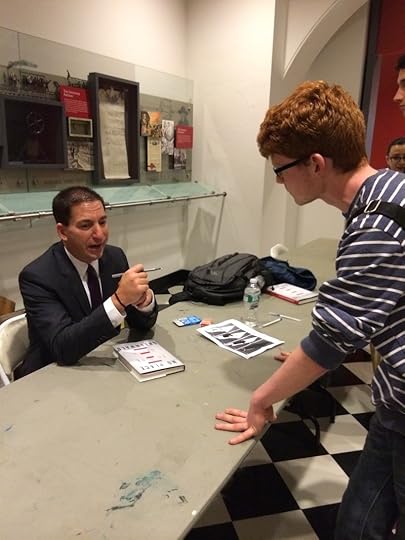
He spoke at length about journalism as an institution, and how many writers have become neutered but sitting as a budding student/digital rights activist in the audience, I was especially interested in what Greenwald had to say about encryption. Since the NSA singles out users who encrypt their e-mails, Greenwald advocated for encrypted e-mail to become the default, creating a logistical impairment for the NSA and reducing the (baseless) inherent suspicion of encrypted e-mail.
Our very own Student Net Alliance's Alec Foster asked what students can do to further the movement:
"I like when people ask me [about students protesting mass surveillance] because if I were to sit at an event for an hour and hear about these great injustices and the sort of corruption -- the problem is that there aren't easy answers. One of the things people have are choices all the time that define them and reflect their values. Y'know, you were saying earlier about how radical dissent is said to say something about your psyche and your moral state but acquiescence says something about that too, so that's always a choice people have every single day: 'Do I engage in dissent, or do I engage in compliance?" That's the choice Edward Snowden was faced with and he made that choice.
But I also think there's this whole war for students and for your energies. I mean, one of the amazing and interesting things is that the NSA is that it's this sprawling system that needs to control the internet [and so they need to recruit] people who know how to control the internet, know how the internet functions, they're people who grew up with the internet, the Edward Snowdens of the world. And so the irony of this is that they need to recruit the very culture that is most inclined to reject its authoritarianism."
As he signed my book, I told him that he'd inspired me to use PGP and to teach it to other journalism students. He looked up at me, his earnestness catching me off guard -- I must've been the hundredth book he signed. "That's what we need", he told me.
May 12, 2014
A Random Encounter
I noticed someone in the park today reading Dan Savage's The Commitment. Savage was a big part of my burgeoning interest in LGBTQ activism in high school and we got to speak once or twice after I wrote a series of essays defending him as someone who'd made an undeniable and indelible mark on LGBTQ youth. After tweeting about seeing a stranger in the park, Dan asked for a pic (snapped with permission), so I got to awkwardly approach an NYC stranger (breaking all sorts of codes), we chatted, and I snapped a picture which Dan proceeded to tweet.
Definitely one of those only-in-NY moments.Thanks for reading! “@tommycollison: @fakedansavage This is @sean_a_mm reading in the park! Made a new friend. http://t.co/m0hfTixncS”
— Dan Savage (@fakedansavage) May 12, 2014

